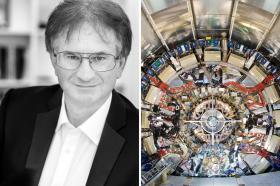The prize celebrates landmark contributions to particle physics using data from the Large Hadron Collider’s second operational run, including detailed measurements of the Higgs boson, studies of rare particle interactions, and investigations into matter-antimatter asymmetry.
Professor Huffman, who has worked on the ATLAS experiment since its earliest days, is a member of the University of Oxford’s Department of Physics. His research is focused on high energy particle physics and the development of advanced detectors for sub-atomic particles. As part of the Oxford HDBS (Hadronic Decays of the Boson Sector) group, he has been instrumental in work exploring how the Higgs boson behaves and decays, continuing to shed light on how particles acquire mass.
Todd works on the ATLAS project alongside Dr James Frost (St Catherine’s College), LMH post-doc Dr Holly Pacey and three graduate students.
The ATLAS Collaboration, which involves over 5,500 scientists worldwide, shares the 2025 Breakthrough Prize in Fundamental Physics with three other Large Hadron Collider experiments (CMS, ALICE, and LHCb). The $3 million prize was split between the collaborations, with ATLAS receiving $1 million.
In consultation with the Breakthrough Prize Foundation, the full prize fund has been donated to the CERN & Society Foundation. ATLAS’s share will support doctoral students from member institutions to spend time conducting research at CERN, providing hands-on experience to developing researchers and strengthening global scientific collaboration.
Professor Huffman’s recent research has involved the first-ever search for producing three Higgs bosons at once. A paper published by Professor Huffman earlier this year sets important limits on how often this process occurs. Finding multi-Higgs states of any kind (two Higgs or three Higgs) helps constrain the shape of the Higgs potential field experimentally. The shape of this field is determined only theoretically at the moment, so illuminating whether this is true is an important topic at the Large Hadron Collider.
Read more about the ATLAS Collaboration's prize on the University of Oxford Physics Department website.



